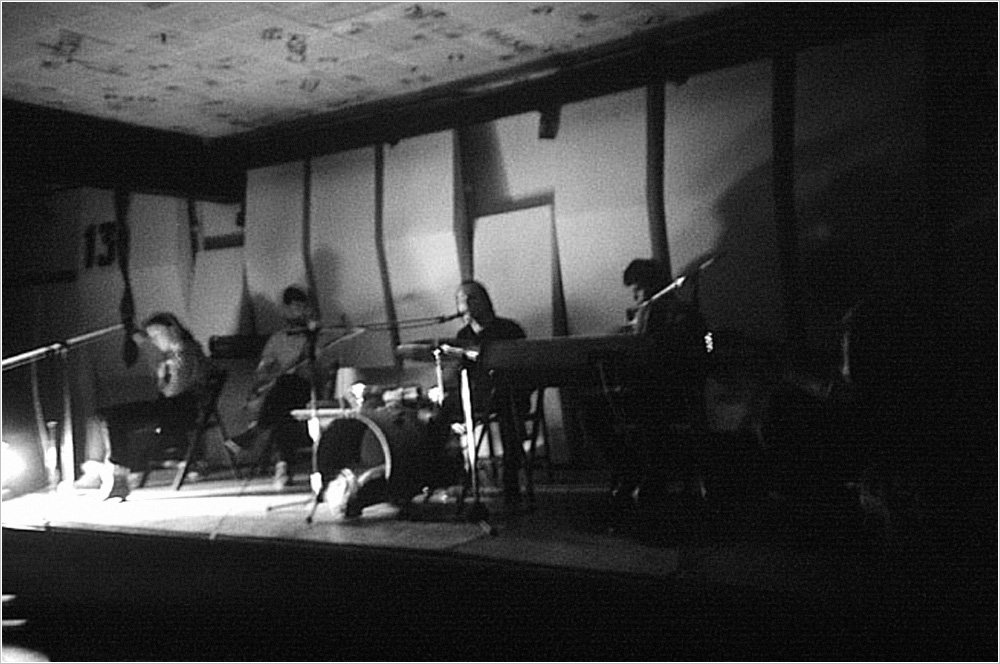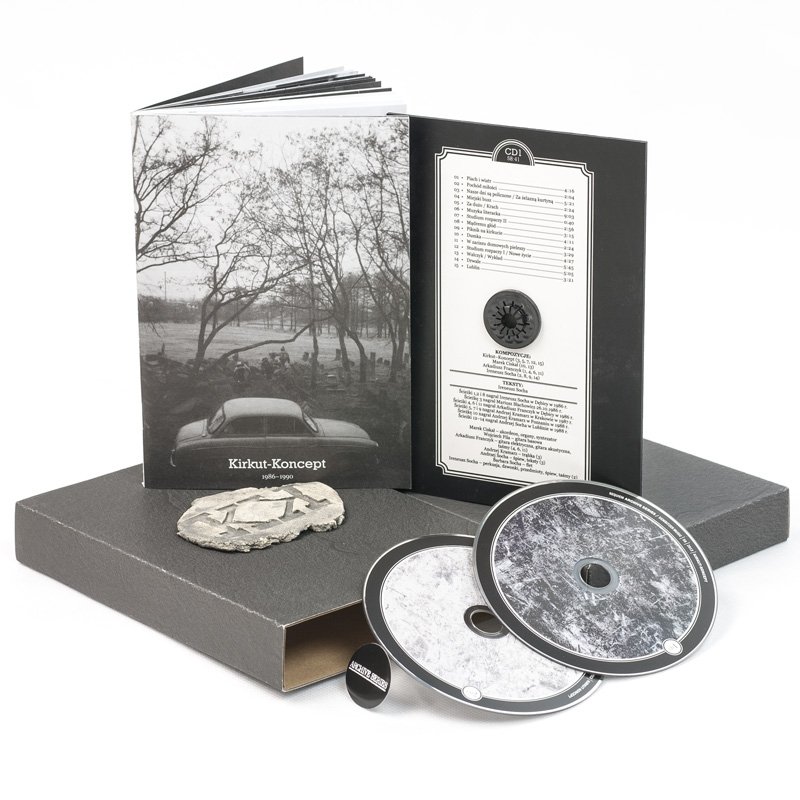
The name of the ensemble referred to the Jewish cemetery (kirkut), located near Socha’s house. This place was a starting point for him to consider work, identity, faith, culture, memory and Polish-Jewish relations. Socha formulated the philosophy of the ensemble in the spirit of conceptual art - referring to a special kind of palimpsest: the interpenetrating layers of cultures, times, styles, languages and fashions.
Socha and Franczyk started creating together in the era of declining Polish People's Republic, that is, during geographic and cultural isolation, general apathy, dullness and the collapse of old social structures. Without any musical education, they learned music by listening to recordings broadcast by radio, on CDs and on tapes. They were fascinated by everything: radio plays, rock, jazz, classical, folk, experimental and avant-garde music.
The band's songs were initially created as a result of group improvisations during rehearsals - all band members were involved in developing their instrumental parts. However, most of the compositions were composed by Socha (who also wrote most of the lyrics) and Franczyk. The music of Kirkut-Koncept was formally and stylistically varied: rock expression and motor skills met the dadaist cabaret, ballad poetry with dirt and noise, experiment with banality and a musical joke with ritual - going from quasi-songs and naive melodies through multi-part instrumental compositions, to group improvisations. At concerts, the band used all these forms. The most important concert programs of the group are: "Piknik na kirkucie" (1987–1988) and "Kamień na kamieniu" (1988–1989). The last concert of the Kirkut-Concept took place on May 16, 1989 in Lublin. For the next two years, Socha tried to reorganize the band and record new material, but due to the lack of interest on the part of the audience and organizers as well as personnel changes - he finally suspended the band's activity.
Kirkut-Koncept was short-lived, but it was an important experiment in Polish rock music. Although the band has no direct followers so far, it is worth noting that with their ideas, "kirkuts" were ahead of their time, being - with all proportions - precursors of playing known much later, e.g. from the Radical Jewish Culture series in the USA or the new Jewish scene centered around Raphael Rogiński in Poland. These songs still have a lot to say.
Tracklist
cd 1
- Piach i wiatr
- Pochód miłości
- Nasze dni są policzone / Za żelazną kurtyną
- Miejski busz
- Za dużo / Krach
- Muzyka literacka
- Studium rozpaczy II
- Mądremu głód
- Piknik na kirkucie
- Dumka
- W zaciszu domowych pieleszy
- Studium rozpaczy I / Nowe życie
- Walczyk / Wykład
- Drwale
- Lublin
Compositions
- Kirkut–Koncept (3, 5, 7, 12, 15)
Marek Ciskał (10, 13)
Arkadiusz Franczyk (1, 4, 6, 11)
Ireneusz Socha (2, 8, 9, 14)
Lyrics: Ireneusz Socha
Tracks 1,2 i 8 recorded by Ireneusz Socha in Dębica in 1986
Track 3 recorded by Mariusz Błachowicz 26.10.1986
Tracks 4, 6 i 11 recorded by Arkadiusz Franczyk in Dębica in 1986
Tracks 5, 7 i 9 recorded by Andrzej Kramarz in Kraków in 1987
Track 10 recorded by Andrzej Kramarz in Poznań in 1988
Tracks 12–14 recorded by Andrzej Socha in Lublin in 1988
Performers
- Marek Ciskał – accordion, organ, synthesizer
- Wojciech Fila – bass guitar
- Arkadiusz Franczyk – electric guitar, acoustic guitar, tapes (4, 6, 11)
- Andrzej Kramarz – trumpet (3)
- Andrzej Socha – vocals, lyrics (3)
- Barbara Socha – flute
- Ireneusz Socha – drums, bells, objects, vocals, tapes (2)
Tracklist
cd 2
- Id
- Konsekwencja
- Sztukmistrze I
- Jeden z wielu
- Pochód miłości
- Nawroty
- Od–do
- Kołysanka
- Podręcznik (Getto walczy)
- Sztukmistrze II
- Hagada
- Konieczność wyboru
- Metafora
BONUSY
- Przez skały
- Pracownik czasowy
Compositions
- Arkadiusz Franczyk (3, 6, 7, 10, 12, 14, 15)
- Ireneusz Socha (1, 2, 4, 5, 8, 9, 11, 13, 15)
Lyrics: Ireneusz Socha
Tracks 1–12 recorded by Henryk Palczewski in Lublin on May 16th, 1989
Track 13 recorded by Piotr Czerny in Dębica in 1990
Track 14 recorded and edited by Piotr Czerny in Dębica in 2008
– additional editing by Ireneusz Socha in 2013
Track 15 recorded and edited by Ireneusz Socha in Dębica in 2010
Marek Ciskał – accordion
Leszek Ciurkot – organ (13)
Wojciech Fila – bass guitar
Arkadiusz Franczyk – electric guitar
Barbara Socha – flute (13, 14)
Ireneusz Socha – percussion, vocals
Production
- Selection of recordings – Ireneusz Socha
- Restoration and mastering of recordings – Marcin Bociński (Legato)
- Tomasz Duda (CD2: 1–12) and Piotr Czerny (CD2: 14)
- Graphic design – Łukasz Pawlak
- Ceramics – Marzena Małecka www.marzenamalecka.com


